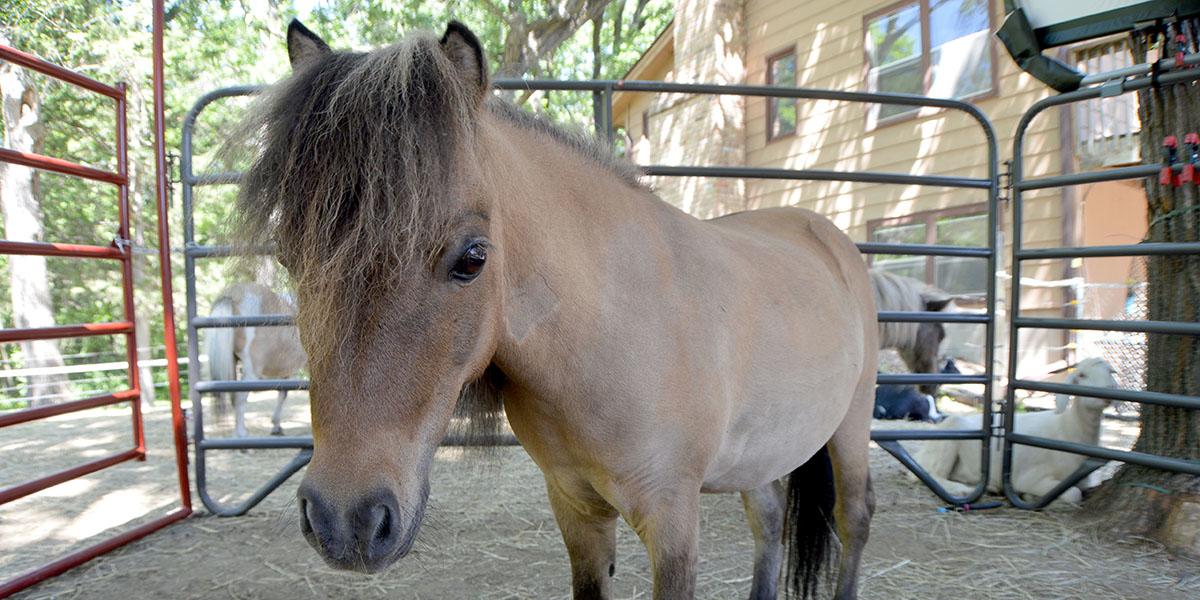Surgical save
Miniature horse fights through big medical emergency

Miniature horse fights through big medical emergency
Bren Stiller has a dream to help people improve their emotional and physical wellbeing through holistic experiences with animals. Over the past two years, she’s worked to make it a reality, setting up Sacred Willow Farm near Shakopee, Minn., and adopting animals from local rescue organizations.
Among her small herd of goats, rabbits, and miniature horses is Charlie, a 12-year old mini horse whose calm demeanor and affectionate nature make him a standout in the role of being a calming presence for visitors.
It’s a role Charlie almost didn’t have a chance to keep filling. During feeding time on a day in late May 2021, Stiller noted Charlie was nowhere near the food. Instead, he had wandered away to roll around and nip at himself. The motion stopped Stiller cold. She knew that a horse rolling and biting at its side is a symptom of colic.
Colic is a broad term that refers to abdominal pain and can be indicative of several different underlying conditions. Concerned, Stiller observed Charlie for a few more minutes.
“I was closely watching him and he rolled again,” she says. “Then I yelled for my husband, grabbed my phone, and grabbed a lead rope because I knew right away I had to keep him walking.”
Charlie’s vet, Bruce Viren, DVM, arrived and administered medication. All the group could do is wait for the medication to wear off and see if signs of colic still remained. If Charlie still presented symptoms, Stiller was advised to arrange transportation to the University of Minnesota College of Veterinary Medicine (CVM).
The symptoms remained and so Charlie was loaded up and taken to Piper Equine Hospital at CVM. There, Katharine Llop, DVM, and the large animal medical team assessed Charlie’s condition. They started medical therapy and saw improvement in Charlie the following day. The mini horse was eating and defecating—both signs he was recovering—but the next day, Llop said Charlie seemed off.
“He just wasn't right,” Llop says. “So we attempted more medical therapy, but he never responded the way we would have liked to see him respond. About three or four days after he came in, Charlie still didn’t seem right. So at that point, we decided that we did want to send him to surgery.”
The decision of whether to perform the surgery weighed heavily on Stiller, who loved her horse dearly but knew her family would take a major financial hit in order to pay for his care.
“I just wasn’t ready to let him go,” Stiller says. “He's only 12, he is young and still has half of his life left. He’s very healthy otherwise, so it was just really hard and agonizing to decide that. Luckily, my husband was really supportive, and he said we’ll make it work. So I was like we’re just going to trust the universe, and we'll just figure it out along the way.”
Charlie underwent surgery, where clinicians discovered an impaction composed of hair and other foreign materials blocking his transverse colon (large intestine), Llop says. Surgeons removed the blockage, and Charlie was on his way to recovery—after overcoming a minor hurdle. As a mini horse, Charlie had an increased risk of developing a condition after the surgery called hypertriglyceridemia, which caused his triglycerides to rise to unhealthy levels. A dose of insulin corrected the condition, and after a final check-up, Charlie was discharged home.
Anyone who owns a horse knows medical care, much less major surgery, is expensive. Stiller says footing the full bill for Charlie’s care would have been difficult for her family. Thanks to the generosity of donors, CVM hospitals are able to offer financial assistance to eligible clients who are unable to afford veterinary care for their animals through the VMC Companion Animal Fund. Stiller says her family qualified for a $1,500 grant.
Words seem to fall flat in comparison to your generosity.
Bren Stiller
“Words seem to fall flat in comparison to your generosity,” Stiller wrote in a thank-card to the fund’s donors. “With donors like you, you took some of the financial burden off and allowed us to focus on [Charlie’s] wellbeing. He is very happy to be home with his herd family, and we are beyond grateful for you!”
The CVM grant, in addition to other funds the Stillers raised with the support of community members, have made Charlie's expenses easier to navigate. Stiller says she is incredibly grateful for everyone who came together to help Charlie through his medical scare.
Charlie continues to make progress in his recovery. Stiller keeps a close eye on him, as does Charlie’s brother Sam and friend Smokey Joe, who observe Charlie from outside his isolation pen. Once he’s fully recovered, Charlie will frolic with his herd once more and rejoin Stiller in her efforts to help others.
I guess that’s the best way to describe Charlie, he is definitely the kind of horse you can just go up to and hug. I’m very grateful he’s still here for me to hug.
Bren Stiller
“I love all my animals. I love each one, they just have their own personalities, and so each one picks a different spot in your heart,” Stiller says. “I guess that’s the best way to describe Charlie, he is definitely the kind of horse you can just go up to and hug. I’m very grateful he’s still here for me to hug.”